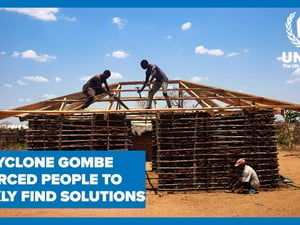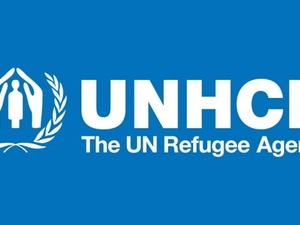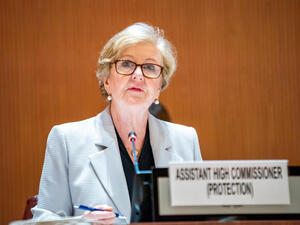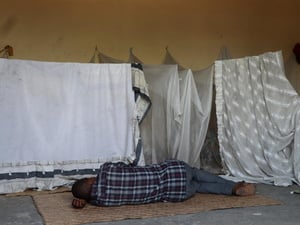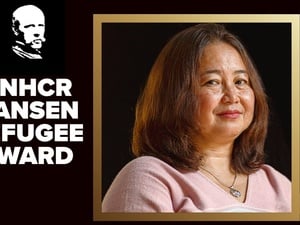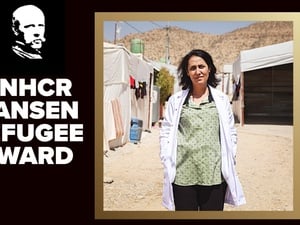Thousands flee west Mosul as fighting intensifies
Thousands flee west Mosul as fighting intensifies

A child displaced from west Mosul receives a UNHCR blanket among other aid items after reaching Hammam al-Alil camp, a few kilometres south of Mosul, Iraq.
HAMMAM AL-ALIL CAMP, Iraq – Out of food, and with artillery falling around his family’s home in west Mosul, Kifah decided he had to get out.
“There were so many mortars falling. We had no rice, no bread, no milk. There was nothing for the children,” he said.
The 35-year-old, his wife and children are among thousands of residents of the west side of Iraq’s second largest city, fleeing as a government military offensive to retake the sector advances.
Displacement from western Mosul has reached around 30,000 in less than a week. In less than 24 hours, the empty Hammam Al-Alil camp began to quickly fill up, becoming a temporary home to thousands of Iraqis desperate to flee the fighting.
Throughout the day, buses and trucks brought exhausted families to the site, about 25 kilometres south of Mosul, where they waited patiently, receiving water and hot meals before being allocated tents.
To help meet their needs, UNHCR, the UN Refugee Agency, is putting up large tented halls which will serve as a temporary reception centre to shelter newly arrived families at the site awaiting screening.
“There were so many mortars falling. We had no rice, no bread, no milk. There was nothing for the children.”
With its partners, work has also begun to set up a new camp less than a kilometre away, which could house as many as 30,000 displaced Iraqis.
Emergency relief items, including mattresses, blankets, hygiene and cooking sets, heaters and jerry cans, are also being distributed to new arrivals.
“In the last few days, sizeable numbers have begun fleeing worsening security conditions and a dire humanitarian situation in west Mosul,” said Bruno Geddo, UNHCR’s representative in Iraq. “We remain concerned for the safety of civilians and urge the authorities to ensure safe passage for all those fleeing."
“UNHCR and other agencies are stepping up emergency assistance for the new arrivals, to ensure they receive all they need to start a new life in the safety of displacement camps until conditions become conducive for return.”
About 192,000 Iraqis have been displaced from the city and its surrounding areas since October 17 when the military operations began. It is estimated that up to 250,000 people could be displaced from western Mosul out of the 750,000 believed to be still residing there.
The relief of those arriving at the government-built Hammam Al-Alil camp is palpable.
“I threw off my hijab as soon as we arrived to the place where the Iraqi Security Forces were staying,” said Kifah’s wife Shayma. “I’m so happy now. We’ve eaten, slept calmly. I’ve had no bad dreams, only good dreams.”
Even so, her husband is wary of returning to their home in the Mamoun district of west Mosul any time soon, citing concerns about active sleeper cell groups there.
“We remain concerned for the safety of civilians and urge the authorities to ensure safe passage for all those fleeing."
For new arrival Saddam, 33, the camp brought a welcome return to normalcy after the intense battle for his neighbourhood. “There were snipers and mortar bombs,” said Saddam who also fled Mamoun with his wife and young children.
“Night times were very difficult. The battle was very fierce. We left everything behind to get freedom,” he said. “Mosul was like a prison for criminals. Now, life is getting back to normal”.
His family spent the night at the camp. But with sponsorship from relatives, they were waiting to leave for the bustling, but war-damaged village in Hammam al-Alil close by, which had been taken by government forces last November. “I want to find a job, to be able to work. And I want my children to go to school,” added Saddam.
After more than two years of strict rules imposed by armed groups, and recent months of shortages of food and other basic items which left many eating just one meal a day - often just bread, potatoes or tomato soup - families are looking forward to new freedoms and possibilities.
“We were scared when we left, but so happy to be here,” said Zeman, 17, who had just arrived an hour earlier by bus with her sister Noor, 32, a mother of four.
The family fled west Mosul’s Wadi Hajar district, managing to escape as armed groups tried to force them to leave their homes for another location as fresh fighting broke out. “I’m happy we’ve left our old lives behind.”


